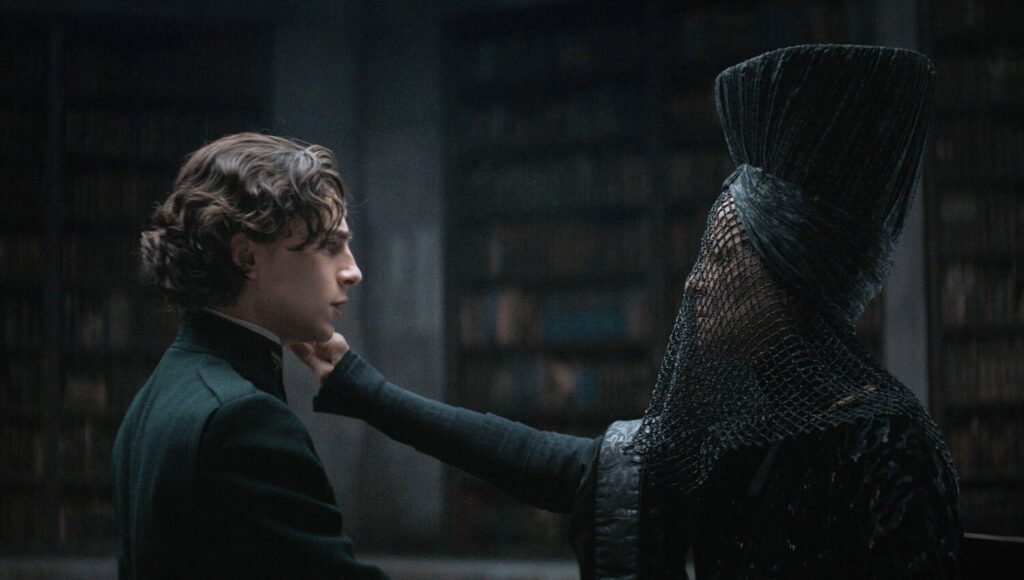Shared from www.latimes.com
The ambition in Denis Villeneuve’s “Dune” was to make a “superbly rhythmic piece” with massive scale, and in many ways, the aural palette was the key to unlocking the emotional door of the story line for editor Joe Walker. A scene early on where a half-asleep Paul Atreides (Timothée Chalamet) and his mother, Lady Jessica (Rebecca Ferguson), are eating breakfast attests to it.
“He is practicing his Bene Gesserit skills [an ancient voice that controls people], and there’s a moment where I cut around everything to make a sort of hypnotic atmosphere. It builds up a certain tension in the room, even though you don’t know why we’re looking at a painting of an older man or a statue of a bullfighter [we find out later both reference Paul’s grandfather who died from a bullfight]. It was actually the sound of the chandelier that opened that door for me.”
The relationship between the sound and imagery in “Dune” stews in subtext. Whether it’s in matching medium close-ups that subtly connect Paul and Lady Jessica to the Reverend Mother (Charlotte Rampling), a bond that amplifies during the deadly Gom Jabbar scene, which tests Paul’s mental strength when he places his hand in the ancient box of pain, or a moment where Paul quite literally stands taller than his father, Leto (Oscar Isaac), saying, “What if I’m not the future of House Atreides?” — a visual hat-tip suggesting that Paul is meant for something bigger.
Walker, who previously worked with Villeneuve on the thought-provoking sci-fi film “The Arrival,” says the director is a master of picking the right shot. “Denis would make a fantastic editor, as he has sequence building in his blood. I always feel like it’s great for me, because I get imagery that’s so well-crafted, but then there’s also room for me to say, ‘Have you also thought about this?’”
One of those unplanned moments is a favorite of the editor’s. A series of shots shows the Atreides family leaving their home to take over spice production on planet Arrakis: Paul kneels down grabbing a blade of grass, family possessions are being packed and a massive ship emerges from beneath the murky waters. The sequence lands on a close-up of Jessica’s neck where Leto puts his hand and she reaches up to hold it.
“I could have cut around and showed many other things in that scene, but this draws your attention to the back of her neck. It’s very elliptical. There’s trust between these two people and love, intimacy and affection. It’s no arranged marriage, there’s passion, faith and support. You can squander 10 pages of dialogue and never get it as emphatic.”
The expressive subtlety of that moment comes back around in one of the more emotional scenes in the movie. After escaping captivity from the Harkonnen, Paul and Lady Jessica are hiding in the Arrakis desert huddled inside a tent. Paul opens a survival kit to find a note and a ring his father wore. It’s an emotional swell that climaxes with the realization that these two characters have lost a father and a husband.
“That’s one sequence that changed enormously,” notes Walker. “We got it to a place where we were happy with it, and we were going to move on, but it was actually [composer Hans Zimmer] who said something to the tune of ‘It could be better.’ Hans never says that, and when he does, it’s very carefully worded.”
Walker and Zimmer have a certain symbiosis between them professionally and personally, which dates back decades. Both lost fathers at a young age. Realizing the composer’s intent, Walker returned to the moment. The scene was originally scripted showing Leto dying with one last breath of vengeance before cutting to Paul and Lady Jessica inside the tent.
“We ended up making the bold move of intercutting so Paul discovers the note the same time Leto dies,” he says. “It helps focus the emotion in one place. The emotion of his death. The emotion of Paul and Jessica discovering it all lands at the same time. It means you get one big strong downbeat. I have to thank Hans for pushing it there.”
Paul’s inner visions were another intricate part of the emotional journey. Shots of palm trees burning, a dagger on the floor, a massive Fremen battle, a crawling bug are a few prophecies laced throughout. Walker approached them as a “movable feast” across the edit.
“It’s something we developed alongside Paul, who is developing this ability. It’s an imperfect ability, so you’re telling a story in many ways. The visions may push you in one direction, but they turn out to be something else. If you remember them, like when Duncan [Jason Momoa] is in the corridor and Paul has a beetle on his finger, it adds a sense of doom. Those things we felt immerse you in the world where a lot of the emotion comes from … where the epic and personal intercut.”
Walker’s connection with Villeneuve has grown from an infectious place of challenge and trust — a feral leap into creativity that mixes stirring soundscapes and vivid imagery. “If the prospect of doing something doesn’t make you sweat, then why do it? It’s like when you’re encountering this book. The litany of fear.”
That recitation from the book: “I must not fear. Fear is the mind-killer. Fear is the little-death that brings total obliteration. I will face my fear.”
“I wish I had known that as a teenager,” Walker says. “It feels like a great something to pin up on your door.”
Images and Article from www.latimes.com

